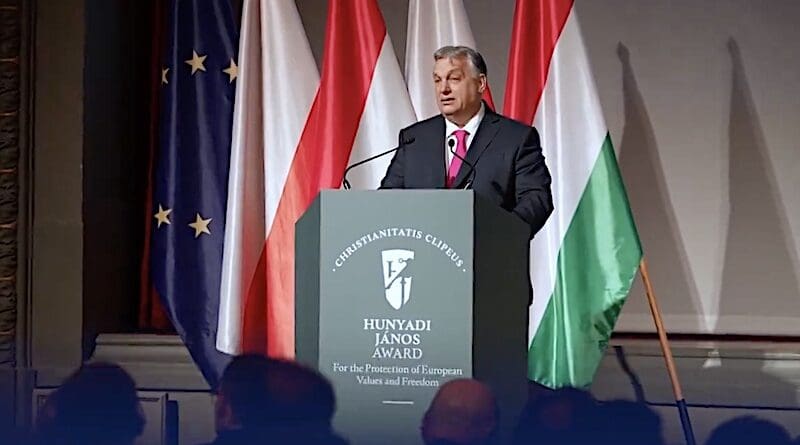European Right-Wing Politicians Call For ‘Preserving Nation-State In Europe’ And End To Ukraine Aid – Analysis
By VOA
By Henry Ridgwell
Right-wing politicians in Europe called for an end to Western support for Ukraine in its war against Russian invaders, as hundreds of people gathered in Brussels this week for the European National Conservatism Conference, which ended Wednesday.
An effort by the Brussels mayor to shut down the conference on security grounds prompted accusations of an assault on the right to free speech.
Orban speech
Hungarian Prime Minister Viktor Orban topped the list of speakers at the event. In his sights were familiar foes: the European Union, immigration and multiculturalism.
“I think that nations have the right to decide about their own future. So, if somebody would like to make an attempt to create a mixed society, a Christian-based with Muslim community, and as a liberal thing that the outcome will be something good — do it, it is your fate, your future — but don’t force us to do so,” Orban told the conference. “We think that mixture of two civilizations will not result in good things.”
Ukraine aid
Just hours before attending a special meeting of EU heads of state at the nearby European Council, the Hungarian leader criticized Western support for Ukraine in its fight against Russian invaders and said his country would maintain ties with Moscow.
“Ukraine is now just the protectorate of the West. So, without getting the money and weapons from the European Union and United States, Ukraine as a state would cease to exist,” he said Wednesday, largely echoing Kremlin talking points. “So, it is not a sovereign state anymore.”
‘Right-wing playbook’
Orban has become the figurehead leader of the European right, according to Georgios Samaras, a political analyst and expert on the European far right at Kings College London.
“Viktor Orban can be perhaps the one strongman that unites the far right — as right-wing forces and central right-wing forces follow his lead because he’s highly successful in pushing an authoritarian practice and authoritarian regime in his own country. I believe that the far right is right now trying to use the same playbook,” Samaras told VOA.
“The far-right danger is here,” Samaras added. “But it was always here and now it’s openly normalized by the elites who are willing to collaborate with those political actors and entities in order to govern and probably abuse democratic institutions.”
EU elections
Despite widespread criticism from both European and American allies, Orban denies undermining democratic institutions in Hungary.
The conservative conference was staged ahead of European Parliament elections scheduled in June. “This is the consolidation of different manifestos into one. And usually when these conferences take place, they’re trying to agree on ideological pledges for the next few years,” Samaras said.
Police action
The conference was almost cancelled when Belgian police blocked access to the venue Tuesday after Mayor Emir Kir issued an order to shut it down over public security concerns.
An emergency court ruling on Tuesday evening, however, overturned the mayor’s order. Nigel Farage, a former member of the European parliament and campaigner for Britain’s EU exit who was speaking at the conference, said the mayor’s actions were an example of what they labelled left-wing “cancel culture.”
“We can see that legally held opinions from people who are going to win national elections is no longer acceptable here, in Brussels, the home of globalism, because if you don’t agree with ever closer union, you must be a bad dude,” Farage told reporters Tuesday.
The effort to close the conference was criticized by politicians from across the political spectrum, including Belgian Prime Minister Alexander De Croo, who described the move as “unacceptable.”
Polls suggest center-right and far-right parties are set to gain seats at the June European elections. An EU survey published this week suggests that Russia’s invasion of Ukraine, and European defense and security, are high on the list of voter priorities.

